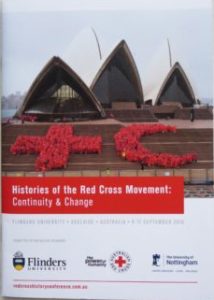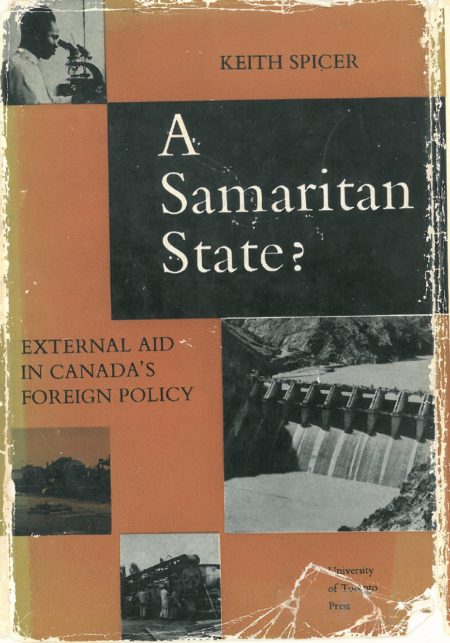The fourth newsletter of the CNNH was sent out this afternoon. For any who missed it, the full text of the newsletter can be read below. This update addresses recent posts, events, and news from the members of the Network.
Page 17 of 23
by Sarah Glassford
This series is being reposted in HistPhil
During the weekend of 9-11 September 2016, roughly 50 scholars, archivists, museum curators, and aid practitioners gathered at Flinders University in Adelaide, Australia to discuss the oldest and arguably most complex of the world’s major humanitarian organizations. “Histories of the Red Cross Movement: Continuity & Change” brought together representatives of more than a dozen countries in Europe, Asia, North America, and Australasia in lively discussions of Red Cross history, Red Cross archives, and the nature of humanitarianism itself. This is the first in a series of blog posts reporting and reflecting on the issues raised at the conference.
“Histories of the Red Cross Movement: Continuity & Change” drew together three thought-provoking keynote speakers from different parts of the globe: American political scientist Michael Barnett (University Professor of International Affairs and Political Science at The George Washington University’s Elliott School of International Affairs, Washington, DC), European historian Davide Rodogno (Professor and Head of the International History Department at the Graduate Institute of International Studies, Geneva), and New Zealander historian Margaret Tennant (Professor Emeritus and Honorary Research Fellow at Massey University, Palmerston North). Each took a particular approach to thinking about the nature of humanitarianism and its history, but collectively their remarks paint a picture of a research field coming into its own.
Tapping into Canada’s research talent for innovative international policy ideas!
Global Affairs Canada (GAC) has published details of this year’s International Policy Ideas Challenge competition. Full details are below and can be found at: http://www.international.gc.ca/world-monde/policy_challenge-defi_politique.aspx?lang=eng
See the SSHRC competition poster.
Past competitions
Closing Date : 19/02/2017
Employment Type : Fixed Term
Duration : 01 March 2017 to 28 February 2018
Faculty / Organisational Unit : Humanities
School/Directorate : School of Arts, Languages and Cultures
Division : Humanitarian and Conflict Response Institute
Hours Per week : Full Time
Salary : £34,956 to £38,183 per annum
Location : Oxford Road, Manchester
Job Reference : HUM-09435
This position is open to academics outside the European Union as well as those from member states.
by Tyler Owens
On December 12th and 13th 2016, the conference A Samaritan State Revisited: Historical Perspectives on Canadian Foreign Aid, 1950-2016 was held at the Global Affairs Canada Lester B. Pearson Building in Ottawa. The aim of the conference was to explore the development of Canadian foreign aid over the preceding 60 years. (In footnote: 2016 was also the 60th anniversary of the publication of A Samaritan State?, among the first scholarly analyses of Canada’s foreign aid policy, written by Dr. Keith Spicer.) Prior to the official opening of the conference, archivists, historians, and members of the aid sector from Quebec and Ontario gathered for a workshop session. The aim of this session was to bring together colleagues from all branches of aid history; those gathered were experts in the archival, library, and document management sciences related to the production, preservation, and use of archives on humanitarian aid. The workshop therefore facilitated the sharing of tips, procedures, and best practices for researching the history of Canadian aid.
The workshop took the form of seven presentations followed by a brief question period.
by David Meinen
First, a quick caveat for the uninitiated – there is no such thing, officially, as a ‘climate refugee.’ While a relatively new phrase, especially in the wake of recent ecological disasters, the idea that climate change would induce a new kind of conflict and migration in the global South has been gaining momentum since the mid-1980s (see El-Hinnawi, 1985). This narrative became firmly integrated into the collective conscience of UNEP and the UNSC in 2007 (Penny, 2007; Hartmann, 2010), followed quickly by Canadian policy-makers and development practitioners (see DND, 2010; Becklumb, 2013). Since then, the relationship between environmental changes, refugees, humanitarianism, and security has materialized in the notion of ‘climate security.’ This notion perpetuates a crisis narrative of politically unstable Third World peoples – colloquially referred to as climate refugees/migrants – fleeing their uninhabitable homelands and (inconspicuously) posing a threat to international security. The speculative nature of this notion brings the climate refugee into being only through “future conditional knowledge practices” (Gemenne & Baldwin, 2013, p. 267); thus, while there is a notable lack of empirical evidence on the phenomenon of climate security (Kothari, 2014), as the debate becomes further enmired in expressions of insecurity, the more the supposed climate refugee is cast as “something to fear and/or control” (Farbotko, 2010, p. 53).
Of potential interest for members of the CNHH, Library and Archives Canada has posted a call for projects for its upcoming DigiLab launch.
From the LAC website:
Appel à contribution – Les acteurs religieux africains à l’ère du numérique
Un numéro de la revue Émulations. Revue des jeunes chercheuses et chercheurs en sciences
sociales à paraître en 2017 sera consacré au thème « Les acteurs religieux africains à l’ère du
numérique », sous la direction de Pamela MILLET MOUITY (École des hautes études en
sciences sociales) et Frédérick MADORE (Université Laval).
À partir du milieu des années 1990 et surtout depuis les années 2000, tout un champ d’études s’est
développé sur la façon dont la religion s’inscrit dans le numérique – sites web, forums, blogues,
médias de diffusion en ligne, réseaux sociaux, etc. Les auteurs de ces recherches ont développé
différents concepts tels que « religion online », « online religion » et « digital religion », pour
mieux appréhender les nouvelles formes de religiosités qui sont apparues grâce au web. Cependant,
peu d’études ont jusqu’à présent traité de manière significative de l’usage de l’Internet par les
groupes religieux du continent africain. Pourtant, la visibilité et la résurgence des pratiques
religieuses de toutes les confessions marquent le quotidien individuel et collectif, tant sur le
continent africain qu’au sein des diasporas. Dans cette nébuleuse, les nouveaux médias numériques
sont devenus des outils, voire des espaces majeurs où se donne à voir ce « religieux africain » dans
sa forme plurielle. Certes, le degré de pénétration et l’accessibilité d’Internet en Afrique demeurent
parmi les plus faibles dans le monde : 28,7 % de la population y ont accès selon des chiffres de
20161. À cela s’ajoutent de grandes disparités entre Afrique du Nord et Afrique subsaharienne,
ainsi qu’entre les différentes régions linguistiques. Malgré tout, son usage est en forte
augmentation : entre 2000 et 2015, le nombre d’utilisateurs est passé de 4 500 000 à plus de
330 000 000.
GLOBAL HUMANITARIANISM | RESEARCH ACADEMY
International Research Academy on the History of Global Humanitarianism
“I found it to be invaluable, and have made several lasting connections from my participation.” –Sonja DeLaat, CNHH Member.
This CfA was originally posted in October 2016 and may be found here along with the GHRA’s poster.
The international GLOBAL HUMANITARIANISM | RESEARCH ACADEMY (GHRA) offers research training to PhD candidates and early postdocs. It combines academic sessions at the Leibniz Institute of European History in Mainz and the Imperial and Global History Centre at the University of Exeter with archival sessions at the Archives of the International Committee of the Red Cross in Geneva. The Research Academy addresses early career researchers who are working in the related fields of humanitarianism, international humanitarian law, peace and conflict studies as well as human rights covering the period from the 18th to the 20th century. It supports scholarship on the ideas and practices of humanitarianism in the context of international, imperial and global history thus advancing our understanding of global governance in humanitarian crises of the present.
Appel à textes
Revue d’histoire de l’Amérique française
Le Québec et l’histoire des ‘autres’
Date limite pour proposition (500-1000 mots): 25 janvier 2017
Le passé des autres et l’expérience de l’histoire au Québec (XIXe-XXe siècles)
De l’interprétation par les Canadiens du XIXe siècle des révolutions française et belge à celle par les Québécois de la Révolution tranquille de l’histoire des pays récemment décolonisés, le passé des autres a été l’objet d’appropriations nombreuses. Si les représentations de ce passé sont en général bien connues, ses appropriations et ses utilisations le sont moins. L’objectif de ce projet est d’explorer l’appropriation d’événements, d’expériences ou de mythes de l’histoire étrangère par les Québécois à des fins à la fois de relectures de l’histoire du Québec et de mobilisation du passé pour transformer la société.






